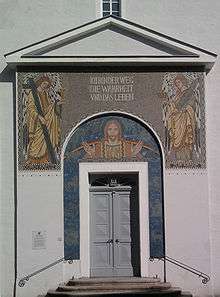Josef Goller
Josef Goller (25 January 1868 in Dachau – 29 May 1947 in Obermenzing) was a German designer, most notably of stained glass.[1]

Life
Goller apprenticed at Franz Mayer & Co. and attended the School of Applied Arts in Munich. After a first employment in Zittau, in 1890 he moved to Dresden, where he joined the well-known stained glass company of Bruno Urban; he later became Urban's partner.[2] From 1906 Goller taught at the School of Applied Arts in Dresden, now the Dresden Academy of Fine Arts, from about 1909 as a professor.[3] Among his students were Otto Griebel (stained glass) and Friedrich Kurt Fiedler (graphics). In 1928 Goller returned to Munich.
Artwork
He created stained glass for town halls in Nuremberg, Dresden, and Chemnitz and for many churches and schools in Saxony and the synagogue of Görlitz, but also for the windows of the neo-Baroque Kaiserpalast, Dresden's most impressive private building at that time, the Dresden Zoo and the Leipzig Hauptbahnhof.[4] Moreover, Goller designed the interior of important national and international exhibitions in Dresden,[5][6] as well as the colouring of the foyer in the Semperoper.[7]
Goller became known for his works in Art Nouveau style, but he remained open to new influences. He was a member of Die Elbier, a post-secessionist movement led by Gotthardt Kuehl which reflected impressionism and en plein air.[8] With time Goller became a supporter of form follows function and joined the Deutscher Werkbund.[9] He also created noted posters [10] and designed books. He had friendly relations with Peter Behrens and Johann Vincenz Cissarz.
Notes
- Josef Ludwig Fischer: Handbuch der Glasmalerei für Forscher, Sammler und Kunstfreunde, wie für Künstler, Architekten und Glasmaler. K. W. Hiersemann, Leipzig, 1914 (three works by Goller)
- Deutsche Kunst und Dekoration. Vol. 1. Verlagsanstalt Alexander Koch, Darmstadt, October 1897–March 1898, p. 116
- Ortsverein Loschwitz-Wachwitz e. V., Ortsverein Pillnitz e.V. (Ed.): Künstler am Dresdner Elbhang. Vol. 1, Dresden, Elbhang-Kurier-Verlag, 1999, p. 53
- Allgemeines Lexikon der bildenden Künstler von der Antike bis zur Gegenwart: Unter Mitwirkung von etwa 400 Fachgelehrten. Ed.: Ulrich Thieme, Hans Vollmer, Felix Becker. Seemann Leipzig, Vol. 14, 1921, p. 345-346
- German Art Exhibition, Dresden 1899
- Dresden Art Exhibition 1912
- Heinrich Magirius: Gottfried Sempers zweites Dresdner Hoftheater. Verlag H. Böhlau, 1985
- Paul Schumann: Article on Die Elbier
- Member list of Deutscher Werkbund, 1 May 1913
- Karl Hoffacker: Kunstgewerbeblatt. E.A. Seemann, Leipzig, 1902
External links
Literature
- Frank Fiedler, Uwe Fiedler: Lebensbilder aus der Oberlausitz, Books on Demand, 2017 (Digitalisat in the Internet Archive)